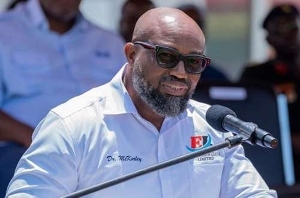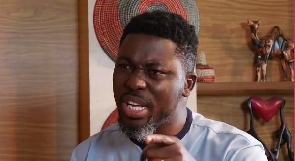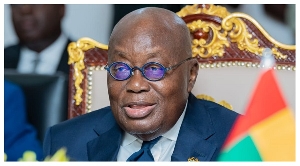Opinions of Wednesday, 4 May 2005
Columnist: GNA
The Silent Witnesses
A GNA Feature by Samuel Osei-Frempong
Accra, May 4, GNA - Along the Accra-Tema Beach Road, the presence of a huge sparkling brick work saves the image of abandoned wooden houses and a large tract of land littered with refuse and human excreta.
Splendid architectural edifices made of smooth bricks enveloped in well kept lawns is a hive of human activity that drowns the fact that from June 1989 to September 1990, it was occupied by the para-military men called the "People's Militia" as it looked haunted and forlorn. The Ghana's Jehovah's Witness Headquarters, like any other building meant for the gathering of the flock of this closely knit community of believers, was closed and declared no-go areas when the then government declared the movement frozen.
They were forbidden to serve their God in the way they deemed fit as they went underground practising their faith in private homes and abandoned farmsteads.
They have a set of beliefs that were not compatible with the revolutionary zeal and principles of those days.
It is even rumoured that certain leaders of certain orthodox churches drew the attention of the young and exuberant leaders of those days that the Jehovah's Witnesses had existed through controversies for a long time.
A 67-year old woman, who shivered as a teenager anytime she heard them preach about the "end time", fondly remembers the Jehovah's Witness.
Madam Harriet Hayfron said they painted an imagery of fire and brimstone travelling at a high speed towards the earth, threatening to consume all non-believers.
"I never thought I could live that long to see the world intact. I was very much afraid," she said
Though she never joined them, she speaks of her admiration for "a people, who have kept faith with their faith."
They are mostly remembered for their alleged end time predictions, which they now dispute; their frequent visits to homes for Bible study and their "Awake!" and "Watchtower" magazines, which have on their leaflets rich intellectual and doctrinal literature. But the zeal with which they evangelise and seek more converts does not accompany the talk about their silent days.
Mr Kofi Owusu, a Stenographer, says: "I remember those silent days when we woke up early in the morning, wore dirty clothing and pretended we were going to farm.
"We took our cutlasses, hoes and baskets concealing our Bibles and study materials and took to the thickets where no one could bother us." But a few mockers hid among the bushes pretending to be security agents and sometimes sent them running for their lives. He said he was constantly harassed and verbally abused and heard of few reports of harassment.
"We were the objects of public ridicule. In fact, sometimes we were openly hooted at."
Some were openly molested but they dared not report to the Police because they feared retribution.
Mr Owusu said:" Let us thank God that many ordinary Ghanaians sympathized with us, as many did not see us as outlaws. We escaped the crucible we dreaded."
The freezing of the activities of the Jehovah's Witnesses, the Mormons and secret societies raises the issue whether religion should be compatible with national aspirations?
The Church of Latter Day Saints (Mormons) is now enjoying a publicity bubble, as they remould their ideology in one of the most beautiful buildings along a ceremonial route in Accra. They have sought to deny their racist past and have gone to town on a spending spree, feeding the poor and stuffing collapsing libraries with books whose relevance to African culture is yet to ascertained. The publicity-shy Jehovah's Witnesses are more associated with certain fundamental issues that question the very basis of orthodox medicine and the idea of the Nation-State.
For instance, they would refuse to take blood transfusion at all cost and not pay homage to symbols of nationhood.
They argue that they have been instructed by the Bible to avoid blood meals, which could to be consumed either by mouth or through the veins.
They have set out proposals to provide an alternative to blood therapy arguing that it kills and dent the human body and psychology. On the flags, coat of arms and other symbols, they argue that paying homage to them amounts to idolatry, which is the most abominable sin to commit.
But where they find spiritual strength, others deem it their apocryphal weakness.
They are hard to find as lovers as they hardly seek warmth in the arms of strangers (non-witnesses). They believe that it is always better to be with a believer.
"It breeds confusion in marriage. It makes the devout partner less religious and makes life an unfulfilled pilgrimage." A Jehovah's Witness told his host last Sunday.
As they argue away their beliefs and seek new converts, they remain silent on their silent days.
"We don't want to talk about it"; says Mr Nathaniel Gbedemah, the Minister in Charge of Public Affairs, at the Ghana Branch. He said: "We were frozen and had our buildings taken over. We talked and got everything back. We think that is enough.
"If we want to make a case out of it, we would have done so," he said.
But when many people thronged the old Parliament House to speak and show the physical and emotional scars to the National Reconciliation Commission, they stayed out and kept silent.
The question baffling many is why would any group of people, who were once harassed and humiliated; keep a tight lid on their immediate past?
It is, however, a fact that their suffering could not be equated to what the Jews endured at Sorbibor, Riga and other death camps neither could it be compared to the sadistic and bestial treatment the Apartheid racists meted out to Black Africans in South Africa; nor the massacre of the black people of Darfour by the Janjaweed - that non-fiction Dracula tale of Southern Sudan.
These dents in history are too gruesome to be compared to what the Jehovah's Witnesses endured in Ghana but it is important to State that taking into consideration the freedom that Ghanaians are used to, a very little scratch hurts.
All Ghanaians who were once hurt should bare their hearts out to sustain the healing process needed for national cohesion.
But if Jehovah's Witness are not of this earth, they should remember that long after they have left us, we would remember them as a group of people, who once lived among us, kept to themselves and even refused to tell us that we once hurt them.












